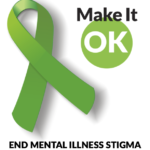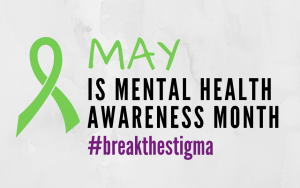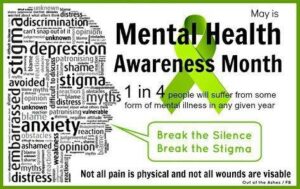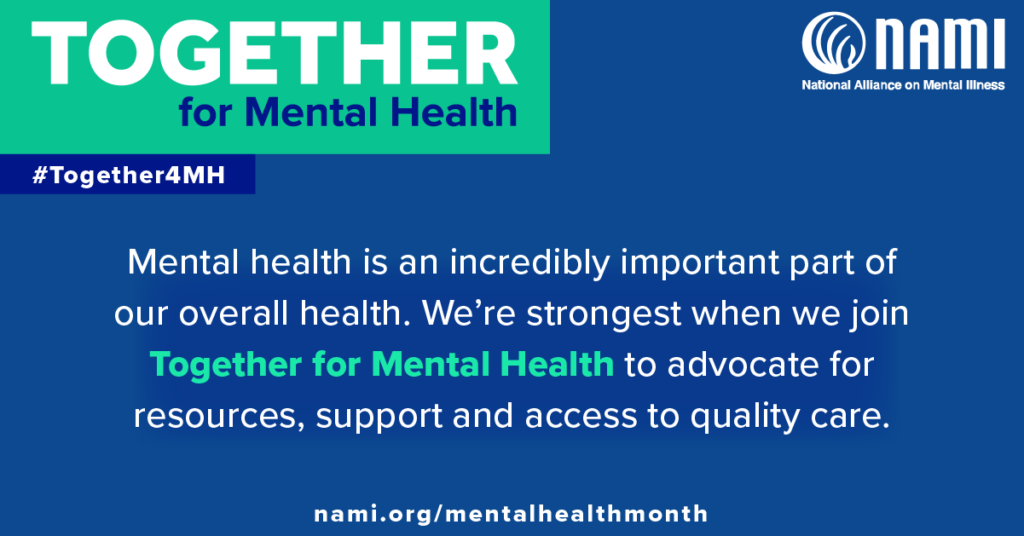May is Mental Health Awareness Month. The month is about realizing how common mental health issues are, supporting each other through them, and removing the stigma about them.
A few statistics:
- 21% of U.S. adults experienced mental illness in 2020 (52.9 million people). This represents 1 in 5 adults.
- 5.6% of U.S. adults experienced serious mental illness in 2020 (14.2 million people). This represents 1 in 20 adults.
- 16.5% of U.S. youth aged 6-17 experienced a mental health disorder in 2016 (7.7 million people)
- 6.7% of U.S. adults experienced a co-occurring substance use disorder and mental illness in 2020 (17 million people)

Whether you’re aware of it or not, you almost certainly know people at work, in your family, or among your friends who are experiencing mental health problems or have done so in the past.
 I’m very open about my own mental health struggles. I’m diagnosed with treatment-resistant major depressive disorder, complex post-traumatic stress disorder (C-PTSD), anxiety disorder, and obsessive-compulsive disorder. I’ve been in treatment for these disorders for most of 30+ years, engaging in individual and group therapies of various sorts including cognitive behavioral therapy (CBT) and dialectical behavior therapy (DBT). I’ve undergone transcranial magnetic stimulation (TMS) and electroconvulsive therapy (ECT) treatments. I have a screening appointment this week for a study on vagus nerve stimulation therapy. I’ve done biofeedback training to help me regain control during panic attacks. I take a daily cocktail of psychiatric medications and will probably be doing so for the rest of my life. There’s also a long, long list of other psych meds that I’ve tried. I’ve had pharmacogenomic testing to help figure out which medications work best for me. I’ve survived one very serious suicide attempt, resulting in several days in the ICU, and have lived with suicidal ideation for most of my life. I’ve been in two psychiatric hospitals as an inpatient and two others as an outpatient.
I’m very open about my own mental health struggles. I’m diagnosed with treatment-resistant major depressive disorder, complex post-traumatic stress disorder (C-PTSD), anxiety disorder, and obsessive-compulsive disorder. I’ve been in treatment for these disorders for most of 30+ years, engaging in individual and group therapies of various sorts including cognitive behavioral therapy (CBT) and dialectical behavior therapy (DBT). I’ve undergone transcranial magnetic stimulation (TMS) and electroconvulsive therapy (ECT) treatments. I have a screening appointment this week for a study on vagus nerve stimulation therapy. I’ve done biofeedback training to help me regain control during panic attacks. I take a daily cocktail of psychiatric medications and will probably be doing so for the rest of my life. There’s also a long, long list of other psych meds that I’ve tried. I’ve had pharmacogenomic testing to help figure out which medications work best for me. I’ve survived one very serious suicide attempt, resulting in several days in the ICU, and have lived with suicidal ideation for most of my life. I’ve been in two psychiatric hospitals as an inpatient and two others as an outpatient.
 Two partners, one with whom I was married and another with whom I was partnered for 14 years, ended our relationships during particularly bad times. I’m one of the people behind the statistic that men are much more likely to leave an ill partner than women are.
Two partners, one with whom I was married and another with whom I was partnered for 14 years, ended our relationships during particularly bad times. I’m one of the people behind the statistic that men are much more likely to leave an ill partner than women are.
I’m a survivor of childhood sexual abuse and I’ve experienced partner, physical, verbal, mental, psychological, financial, and religious abuse. Experiences with bullying and stalking have exacerbated the effects of that abuse. I also have multiple intersecting conditions that cause chronic pain, which contributes to anxiety and depression. There are no cures for Ehlers-Danlos Syndrome, fibromyalgia, osteoarthritis, spondyloarthropathy, bursitis, degenerative disc disease, or chronic myofascial pain, so I will be dealing with that pain for as long as I live.
I’m not ashamed of any of my health issues or the treatments they require—in fact, I’m proud of surviving this long and recovering as much as I have. I was on disability for years due to these conditions but was happily able to return to full-time work a few years ago. In addition to my work as a support engineer, I volunteer, spend time with my extended family, and socialize. I miss very little time during my 50-60 hour work weeks. I always carry medication to help deal with panic attacks, just as I carry my EpiPen (for bee stings), asthma inhaler, and migraine rescue medication.
A few resources to help if you’re one of the 46.6 million experiencing a mental illness:
- Mental Health Awareness Month Checklist
- The Depression and Bipolar Support Alliance has support groups across the country as well as other resources such as their Wellness Wheel and Wellness Tracker
- The National Alliance for Mental Illness offers support groups, a crisis hotline, online discussion groups, and more.

